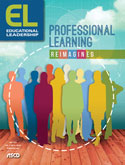In my years of teaching and watching teachers teach, I've learned that positive change in instruction happens one classroom at a time. Even in the relatively rare instances when headlines herald overall school improvement, the improvement happened because a critical mass of individual teachers made productive shifts in their individual work. What great school leaders do—through inspiration, cajoling, support, and attention—is evoke change in classroom practice, teacher by teacher.
So what might happen if those of us arranging conditions for professional learning shifted from emphasizing the group setting to emphasizing the classroom? There is undeniable value in attending high-quality presentations, reading articles or books, watching videos, and taking online courses. But when those things become a teacher's only professional development practices, good intentions almost inevitably exceed results.
How Katrina Learned
What might classroom-centered professional development look like? Katrina, a midcareer high school teacher, unintentionally provided me with a model of this kind of learning. Katrina participated in a week-long workshop on differentiated instruction that I led in London two summers ago. It would be nice to assume that this experience would have been life-changing for Katrina no matter how she approached it—I conducted it, after all! In fact, the workshop was life-changing for her, but not because of me. It changed Katrina's practice because she came primed for change.
In Katrina's school, teachers are encouraged to study their own work, clarify their strengths and deficits as educators, and plan steps to enhance the former and correct the latter. So, unlike other workshop participants, Katrina contacted me several months in advance to let me know her teaching goals and to see how the workshop could help her move toward those goals. My awareness of what she hoped to achieve sharpened the focus of my planning and primed me to directly link the guidance provided in the workshop with Katrina's needs in her classroom.
At the end of the week, most participants left with some inspiration and practical ideas in tow. But Katrina left with a series of lessons she had created and a plan, with goals and timelines, for implementing these lessons in her classroom. An English teacher who emphasizes writing to build understanding, clear thinking, and voice, Katrina created a year-long series of writing prompts that were probing and differentiated to address a broad range of student needs.
The conditions for teacher learning that her school had established made Katrina's focus possible. Katrina returned to an environment in which a teacher's classroom was viewed as a living laboratory. She implemented the plans she'd created, systematically reflected on what took place in her classroom, and used what she learned to make changes in multiple aspects of her teaching. As a result of her new insights and skills, she became more attuned to her students as individuals (and skilled in using multiple approaches to help them achieve important goals), more flexible in classroom routines, and more comfortable with students as engineers of their own learning. Katrina's classroom came to more closely resemble the image she'd held in her mind of a "learning place." She and her students felt at home.
What Katrina Taught
Six months later, I received another e-mail from Katrina. She explained what she felt she was accomplishing and what she thought her next steps should be. She was returning to the workshop for a second summer—this time, however, she wanted to use the sessions and faculty for an independent study. In other words, she felt she'd benefit from coming to portions of sessions that aligned with her needs and from talking with other participants whose teaching contexts and interests could push her thinking forward. She believed the workshop faculty could help her focus and refine her work. Mostly, however, she wanted time to work on creating teaching plans and student tasks that she would use in the year ahead.
Katrina's ideas were as instructive to the workshop staff as ours were to her. She had great clarity about how she could enhance teaching and learning in her classroom. Her ideas were permeated with students' faces and stories. She visibly translated the principles of the workshop into classroom reality.
I asked Katrina to share samples of her work with participants on the last day of the session. She shared her experience with trying to apply, within her classroom, the ideas we'd talked about in our week together. She said something like this:
I went away from here last summer with the intent to change nearly every aspect of my classroom. I was clear on what I needed to change and largely on how I would make the changes happen. But teaching is hard. It consumes you, and I made only a fraction of the changes I'd hoped to make. I was disappointed in myself. Then I realized that those few changes revolutionized what was happening in my classroom. So I'm staying the course. This summer, I won't go home with the illusion that I can change everything, but I will return with plans to modify several processes. Getting teaching right is incremental. I'll continue to learn, and my school will continue to support me in that journey.
What If?
What if a big part of most professional development was mentoring teachers in doing reflective teaching? What if we guided teachers in crafting questions about teaching and supported them in finding insights and trying out classroom changes? What if we all understood that energy for teaching derives from our own growth propelling the growth of our students, that teaching is learning and that real learning translates into action? And that the center of such learning has to be our classrooms.
